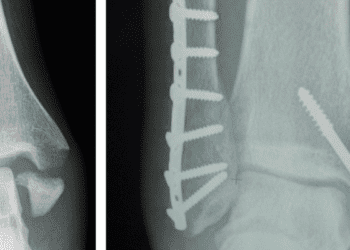DuraPrep may be superior to Chloraprep for preventing perioperative skin infections
1. In patients undergoing elective total hip arthroplasty, this randomized trial found that the most common bacterial organisms prior to skin preparation were coagulase-negative staph.
2. Following skin preparation, patients randomized to receive DuraPrep had a significantly lower proportion of positive skin cultures when compared to patients who had received Chloraprep.
Evidence Rating Level: 1 (Excellent)
Postoperative infections are relatively uncommon following hip arthroplasty, but when they do occur, they can lead to significant patient morbidity and cost. A possible risk factor for postoperative infection is the amount of bacterial skin flora present at the operative site at the time of surgery. The use of antimicrobial preoperative skin preparation solutions is routine in surgeries; current guidelines as per the Centers of Disease Control and World Health Organization recommend an alcohol-based preparation combining chlorhexidine or iodophors with alcohol; however, these guidelines do not provide consensus on which agent to combine with alcohol. Previous research has investigated bacterial cultures prior to and following orthopedic surgery in many different areas; however, this research is not necessarily applicable to surgery involving the hip, given the adjacent areas. The purpose of this randomized controlled trial was to examine native bacteria present around the hip and to assess the efficacy of two surgical skin preparation solutions, ChloraPrep (2% chlorhexidine gluconate and 70% isopropyl alcohol) and Duraprep (0.7% iodophor and 74% isopropyl alcohol). 105 patients undergoing primary total hip arthroplasty (THA) were recruited from October 2014 to December 2015 at a single center and randomized to receive ChloraPrep or DuraPrep as surgical skin preparation. Patients had their culture specimens collected prior to skin preparation, following skin preparation, and following skin closure. The most common organisms isolated were Staphylococcus epidermidis, Corynebacterium, Micrococcus luteus, S. hominis, and S. capitis. Following skin preparation, the overall proportion of positive culture results was significantly lower in the DuraPrep group compared to the ChloraPrep group (14% [n=7] vs 35% [n=19], adjusted RR 0.40, 95% CI 0.18-0.85). At this stage, the most common bacterial organisms were M. luteus (15 isolates), Corynebacterium (4 isolates), and S epidermidis (3 isolates). After wound closure, there was no significant difference in positive culture rate between the two groups (29% [n=15] vs. 35% [n=19], adjusted RR 2.10, 95% CI 1.12-3.95). With respect to complications, three patients total had complications within 6 weeks of surgery, 1 (2%) patient in the ChloraPrep group and 2 (4%) patients in the DuraPrep group (p=.6). At 3 months, no superficial wound complications were identified, and no deep wound infections were encountered during this study. Overall, the most common skin flora in the hip area from this study was found to be S. epidermidis, Corynebacterium, M. luteus, S. hominis, and S. capitis. The findings from this study suggest that DuraPrep was initially more effective than ChloraPrep following application, though there was no difference after wound closure. In addition, this initial difference is due to isolates of M. luteus, and there is questionable clinical significance of M. luteus as a positive skin culture as it is a rare cause of periprosthetic infections. A major limitation of this study is the small sample size; given that periprosthetic joint infections following elective THA are quite rare, this study is underpowered to show correlation between joint infection and type of skin preparation solution. Further studies with larger samples will be beneficial to identify the most effective type of surgical skin preparation to prevent periprosthetic joint infections.
Click to read the study in the Canadian Journal of Surgery
Image: PD
©2022 2 Minute Medicine, Inc. All rights reserved. No works may be reproduced without expressed written consent from 2 Minute Medicine, Inc. Inquire about licensing here. No article should be construed as medical advice and is not intended as such by the authors or by 2 Minute Medicine, Inc.









